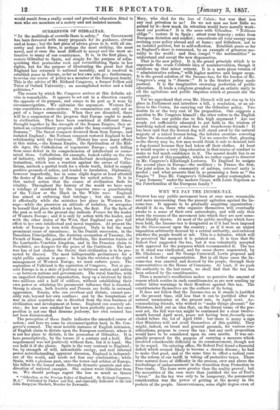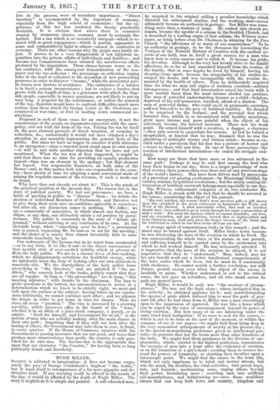WHY WE PAY THE INCOME-TAX.
SELDOM has any public movement been at once more reasonable and more unreasoning than the present agitation against the Income-tax. It appears to be gradually acquiring organization : should it do so, those who organize themselves will eventually awake to a sense of their own antecedents, and will only then learn the reasons of the movement into which they are now somewhat blindly drawn. At most of the public meetings which have been held, the Income-tax is designated as if it had been imposed by the Government upon the country ; as if it were an unjust imposition arbitrarily decreed by a central authority, and enforced whether the people would or not. This is a delusion, which will be perceived the moment it is pointed out. It is true that Sir Robert Peel suggested the tax, but it was voluntarily accepted with approval for the purposes which recommended it. The tax as it stood was vindicated, and for cause shown augmented, by Mr. Gladstone ; and Sir George Cornewall Lewis proposed and carried a further augmentation. But in all these eases the Income-tax was enacted and decreed by the people, through their representatives in the House of Commons. At least, if we push the authority to the last resort, we shall find that the tax has been ordered by the constituencies.
Thus a moment's recollection makes us perceive the amount of reason which resides in such constituencies as are now sending up rather bitter warnings to their Members against this tax. The constituencies themselves are the authors of its being.
It does not follow that the Income-tax as it stands is justified at the present time, still less that it can be justified after its natural termination at the present rate, in April next. Accommodating friends, who wished to "make things pleasant" for Ministers, held out an idea that, on the literal terms of the present act, the full war-tax might be continued, for a clear twelvemonth beyond April next, peace not having been formally concluded before the 1st of April 1856: but there is many a sign that Ministers will not avail themselves of this quibble. They might, indeed, on broad and general grounds, for various considerations, propose to renew the tax : but any such proposition would have to be considered upon its own merits. It was originally proposed for the purpose of carrying a measure which involved considerable difficulty in its commencement, though not in its sequel. On entering office, Sir Robert Peel found a financial deficit which seemed likely to become a chronic disease ; he had to make that good, and at the same time to effect a radical cure by the reform of our tariff, in taking off protective taxes. .There were natural fears of difficulty. in the process, over and above the forebodings of embarrassment in the transition from Protection to Free-trade. The fears were greater than the reality proved; but the necessities of the case more than justified the use of Peel's "lever." As the tax was only to be temporary, the paramount consideration was the power of getting at the money in the pockets of the people. Inconveniences, some slight degree even of loss in the process, were of secondary importance. "Direct taxation" is recommended by the argument of economy, especially from the high school of economists ; but the experience of this tax has rendered the theory practically doubtful. It is obvious that where there is extensive evasion by numerous classes, economy must be seriously i disturbed. But a tax which is so excessively unequal—which s resisted with so great repugnance—which is partial, oppressive to some and comparatively light to others—cannot be conducive to economy. There are other reasons why the people may justly object. It proves to be a very disagreeable if not injurious inquisitionfamilies;
quisition into the private affairs of individuals and and Income-tax Commissioners have attested the mischievous effects produced by the inquisition. These abuses become worse as the tax continues, with the consequent demoralization of the taxpayer and the tax-collector ; the percentage on collection urging some in the herd of collectors to the invention of new persecuting
recesses in order to discover "income," while the persecuted publearns new devices of avoidance. The endurance of a burden is in itself a serious inconvenience ; but to endure a burden that
grows with the length of time, is a grievance with which the English people, especially in money questions, are not likely to put up
very long. A proposal for the continuance, or rather the renewal of the tax therefore would have to confront difficulties much more serious than those which Sir George Lewis or Mr. Gladstone encountered in war-time, or Peel in beating down commercial restrictions.
Proposed in each of these cases for an emergency, it met the acquiescence of the people on arguments connected with the emergency, and not with the form of the tax. Taking the tax by itself on the pure abstract grounds of direct taxation, of economy in collection, &c., undoubtedly it would not have obtained a day's attention in any assembly representing the general 'body of the public. But since we have no longer to consider it with reference to an emergency—since a renewal must stand upon its own merits —it will be met with another objection that we have not yet mentioned. When the tax was at first suggested, it might be said that there was no time for providing an equally productive impost---time was an element in the apology; but that element has lapsed. Our responsible financiers, on both sides of the House—and in this matter both sides are responsible to the country—have plenty of time for adopting a more convenient mode of raising the requisite amount of the revenue, if such a mode can be found.
Why have they not already set about it? This is the pinch of the practical question at the present day. The reason lies in the state of political society. We feel our grievances ; we have a habit of meeting in public to " discuss " them ; we debate the election of individual Members of Parliament, and threaten not to give them their seats save on conditions agreeable to ourselves ; but after all, our discussion comes to nothing. We differ; we are a community of minorities, in which almost any faction, any clique, or any man, can ultimately attain a set purpose by perseverance. The public is constantly in the state of "debate adjourned," without arriving at any conclusion of its own. At the eleventh hour, when "something must be done," a provisional vote is passed, requesting Mr. So-and-so to act for the meeting ; and the choice of a course thus almost invariably falls to some respectable busybody, by lot.
Our endurance of the Income-tax in its worst form unamended —or in any form, if we like it not—is the direct consequence of that morbid state of over-excited debility which at present afflicts the body politic. We are in a chronic fever of fuss-making, which we disingenuously substitute for healthful energy, while we indolently leave the duty of looking after our own interests to somebody else. We the shareholders of the body politic leave everything to "the directors," and are satisfied if "the auditors," who scarcely look at the books, politely report that they are all regular. So long as "the proceedings" arc in form "this meeting adjourns," with thanks to the chairman. Too lazy to probe questions to the bottom, too unconscientious to arrive at a determination which we know to be strictly right, we meet and talk upon the surface of the subject: having taken up our conclusions arbitrarily, we cannot convince each other ; and we adjourn the debate in order to get home in time for dinner. Thus we stave off every "question." The vice is increased by a growing' servility, which preserves office in the hands of the "dons," whether it be an affair of a joint-stock company, a parish, or an empire. "Each for himself, and Government for us all," is the maxim of men who are selfishly looking after the main chance in their own path ; forgetting that if they will not look after the taxing of others the Government may take them in rear, in flank, in every quarter. If the House of Commons connives with the Government in passing measures that are not good, and taxes that produce more inconvenience than profit, the country is only punished for its own sins. The Income-tax is the appropriate fine upon that lax character "the Country," for having been so long politically drunk and disorderly.

































 Previous page
Previous page